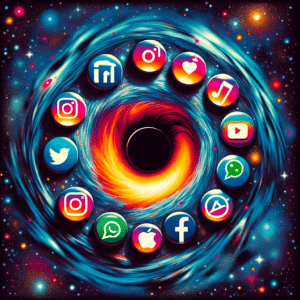
Instagram has become a dangerous and toxic menace to society at large. Meta is truly one of the most irresponsible companies in history allowing for popularity to take precedent over decency, in regards to violating the rights of its users and therefore, of the youngest generation of humanity. Social media is wrecking the lives of American youth by allowing toxic, even violent behavior. Does Facebook still sell our email addresses? Their ethics seem to be non-existant. Many other tech companies are facing scrutiny for the affect their technologies have on the user base.
Honestly I do believe that Instagram has become an extinction level threat. The toxic negative impacts of the irresponsibly managed company have already destroyed countless lives. Why don’t you report on that Instagram? In combination with the lack of responsible government oversight and regulation and obvious corruption, Instagram could cause the destruction of America and humanity. The failure of America’s government and American academic institutions and cannot be overstated. The social media companies are obviously also to blame.
Here are the leaked documents from Facebook and Instagram:
“In a blog post, Facebook released two slide decks that had informed the Wall Street Journal’s bombshell report(WSJ) from mid-September indicating that the company knew from internal research conducted in 2019 that its subsidiary platform Instagram was harming the mental health of teen girls, particularly when it comes to body image.”
“More than a year after the Facebook Papers dramatically revealed Big Tech’s abuse, social media companies have made only small, slow steps to clean up their act,” Sen. Richard Blumenthal (CNN Business) The Facebook and Instagram wellness hubs make ABSOLUTELY no mention of the data of these analyses, the statistics, or the math. They are trying to hide the tremendous amounts of negative data about them.

Children and even young adults shouldn’t have access to social media. The data is very clear. They aren’t ready for that kind of hyper-connectedness. They need strong nuclear family connections and during development these kinds of products are far too influential on them and turn them into products for advertisers and the social media companies.
The negative impacts of Instagram on youth culture in America have been a subject of growing concern for the adults populations at large. As various studies and reports highlight significant adverse effects, more studies are released about the harmful quality of the algorithms involved in the platform’s popularity and engagements. This is all supported scientifically, you can see the sources at the bottom of the article. There are a lot of them, because this is a well-documented problem.
Key issues involving social media use for non-adults include:
- Body Image and Self-Esteem Issues: Instagram has been linked to negative effects on young people’s feelings about their appearance and body satisfaction. The platform can exacerbate risks for eating disorders and other mental health concerns such as depression and low self-esteem. A study cited by The Wall Street Journal found that 32% of teen girls felt worse about their bodies after using Instagram, indicating that the platform can significantly alter how young women view and describe themselves. Sounds pretty dangerous and mentally poisonous.
- Mental Health Concerns: Instagram’s design, which capitalizes on the biological drive for social belonging, encourages continuous scrolling and engagement. This mechanism has been associated with mental health issues like depression, social anxiety, and self-esteem problems and is called . Exposure to Instagram’s narcissistically oriented content, driven by a business model focused on maximizing user attention, can have cumulative negative impacts over time.
- Increased Mental Distress and Suicidality: Research implicates smartphone and social media use, including Instagram, in the rise of mental distress, self-injurious behavior, and suicidality among youth. The effects are particularly pronounced among girls, suggesting a dose-response relationship between social media usage and mental health issues. Suicide numbers are difficult to discern directly because of the amount of coinciding variables in a suicide; however rates have steadily increased with the adoption of social media as a norm. Cyber-bullying has also contributed to this numeric increase in a significant way.
“Most teens report at mental health issue” -<(instagram reports)>.
The Mental Health concerns can be further categorized:
- Loneliness
- Depression
- Eating Disorders
- Body Dissatisfaction
- Body Dysmorphia
As an adult that once was a kid with the internet, putting hyperconnectedness into the hands of the youth is irresponsible at best. The highlight reel effect is omnipresent on the platform and the internet as a whole and isn’t really understood by most folks. Kids need to be taught this kind of stuff in school; parents can’t be relied on to teach their kids this stuff because a lot of them don’t know about it. Kids need parents to help them navigate the thick and difficult world of technology that has become more and more predatory over time, from video games, to social media, to conspiracy theories, to just general laziness and confirmation bias and a sense of privilege and narcissism that seems to have become rampant in American society. Teachers, educators, and family, parents, brothers sisters, etc. typically share values to create humility. That’s why we generally both love and hate the time around our parents.
With the advent of all of this new, super powerful technology, we are at a crossroads of a civilization, especially in this country. America can either learn to be ethical, to strive for the greatest good, or we will become a corrupt pile of shit-bags that just want to argue and compete with each other to be the best in some imagined competition. There is always hope for something greater.
These findings underscore the need for greater awareness about time spent on social media. and intervention strategies to mitigate the harmful effects of Instagram on the mental health and wellbeing of young people in America. If you know someone that is spending way too much time on Instagram, or Facebook, or any other platform, you should tell them. Be their friend in real life.
What Precautions can you take to Mitigate the Negative Impacts of Social Media
- Take a break every 10 minutes. Try not to spend more than an hour on social media. TikTok has proven to be a data feed for China and its algorithm is very different for Americans and Chinese citizens. In a court filing, the former employee of ByteDance, Yintao Yu, alleged that the CCP spied on pro-democracy protesters in Hong Kong in 2018 by using “backdoor” access to TikTok to identify and monitor the activists’ locations and communications. There is certainly potential for this to happen to Americans, through Instagram and Facebook.
- Remember that Instagram is highly manipulated. It is literally subsidized by the FBI, Homeland Security, and the State Department to monitor potential terrorist activity (this is actually a good thing right now, imo). However, even when you use your privacy settings, your social media accounts are not totally private. How much privacy an American citizen gets should at least be a matter of debate for the people, as well as our representatives. In most cases, Facebook, Twitter, Instagram, and other social media companies will voluntarily share your information and personal messages with law enforcement agencies, whether they have a warrant or not[21].
- No one actually looks like the actors do in movies (although some are undoubtedly more attractive in reality because of their distinctive, unique, and charismatic personalities). Don’t compare yourself to others on the platform; deep friendships and family relationships are the most rewarding according to modern psychological data[20].
- There are significant weaknesses in Facebook’s and Instagram’s algorithms. They are very flawed. Deep connections are created and fostered in real life; digitalization of friendship simply isn’t rewarding to us. Social media is most effectively used as an enhancement to real life interaction, not the other way around.
- Limit your social media use. 30 minutes per day, per platform is probably a lot, but reasonable for a younger adult. More time on a site might be acceptable for work; if you are growing a business on social media sites, I say good luck to you. Use it for friendship.
- Explain to your kids what Instagram is. Teach them how it is flawed and how reality truly work.
- Spend more time with your children and kids in general in the analog world. It’s where we are meant to be.
References:
- BMC Psychology
- Faces engage us: photos with faces attract more likes and comments on Instagram
- Instagram Use, Loneliness, and Social Comparison Orientation: Interact and Browse on Social Media, But Don’t Compare
- What the brain ‘Likes’: neural correlates of providing feedback on social media
- Effects of Instagram Body Portrayals on Attention, State Body Dissatisfaction, and Appearance Management Behavioral Intention
- The Interaction between Serotonin Transporter Allelic Variation and Maternal Care Modulates Instagram Sociability in a Sample of Singaporean Users
- Instagram use and young women’s body image concerns and self-objectification: Testing mediational pathways
- The impact of excessive Instagram use on students’ academic study: a two-stage SEM and artificial neural network approach
- The Power of the Like in Adolescence: Effects of Peer Influence on Neural and Behavioral Responses to Social Media
- Cue-Reactivity Among Young Adults With Problematic Instagram Use in Response to Instagram-Themed Risky Behavior Cues: A Pilot fMRI Study
- Peer Influence Via Instagram: Effects on Brain and Behavior in Adolescence and Young Adulthood
- Instagram and Seizure: Knowledge, Access, and Perception of Circulating Information on the Internet
- Oxytocin Receptor Gene Polymorphisms and Early Parental Bonding Interact in Shaping Instagram Social Behavior
- SnapChat Parental Guide
- Facebook is hitting the brakes on Instagram for kids
- Cisomag.com – Instagram data breach! 49 million users’ sensitive data exposed online
- Slate.com – The Most Damning Thing We’ve Learned About Instagram Yet
- Firstpost.com – Leaked documents reveal Meta knew Instagram was pushing girls towards content that harmed mental health
- Vice.com – Leaked Documents Show How Instagram Polices Stories
- Instagram Psych Files on Appearance Based Social Comparison
- Study.com – Things that make people happy
- werksmanjackson.com – Is the Government Monitoring Your Social Media Accounts?
- Brennan Center of Justice – Federal Government Social Media Surveillance Explained
